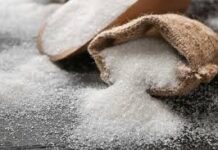LAHORE: The fruit pulp industry has urged the government to encourage the mango growers and exporters to go for conversion of mango fruit into natural pulp (without any additives and preservatives) through Aseptic packing that increases the shelf life up to 24 months and could help increase exports by $500 million in the world after coronavirus. People in the industry said that every crisis comes with an opportunity.
Coronavirus pandemic is also offering opportunities to different countries and business sectors. “Fruit sector of Pakistan has been offered one such potential opportunity,” they claimed.
The informed sources said that this would not only preserve the fruit content for up to 24 months but also create exportable surplus as the mango pulp is in high demand in the international market.
With increasing health consciousness, especially in the post corona world, people are likely to have preference for organic food and this provides Pakistan a potential opportunity to earn foreign exchange of multi billion dollars through the export of mango pulp, the sources noted.
The pulp industry sources also demanded that the government should also encourage the private sector to invest in pulp facilities and central bank/commercial banks should provide loans on reduced rates (LTFF and working capital lines).
Mango Production in Pakistan
Mango is grown in more than 100 countries of the world. As of today, the total annual estimated production of mango across the globe is above 44 million tonnes.
Ahsan Budh, an agriculture expert from Muzaffargarh said that in Pakistan, total area under cultivation for all fruits is 853 thousand hectares with the total production of 7.179 million metric tonnes while area under mango cultivation is 167 thousand hectares that produces around 2.30 metric tonnes being the second major fruit crop of Pakistan after citrus.
He added that according to the latest Food Outlook report published by the Food and Agriculture Organisation of the United Nations (FAO), Pakistan is the 5th largest mango producer after India, China, Thailand and Indonesia.
Mango cultivation area
Budh said that more than half of the mango production area falls in Punjab (104.9 thousand hectares) followed by Sindh (50 thousand hectares) and then Balochistan and Khyber Pakhtunkhwa (KP) with 1.4 thousand hectares and 0.3 thousand hectares respectively.
He added that the districts which are important for production of mangoes are Bahawalpur, Dera Ismail Khan, Hyderabad, Multan, Khanewal Sahiwal, Muzaffargarh, Sadiqabad, Rahim Yar Khan, Vehari and Thatta.
Wastage
The sources added that Pakistan produces the best quality mangoes, in terms of nutritious value and also in appearance and condition as well.
“However, a substantial quantity is wasted from farm to market (post-harvest losses); some estimate this wastage up to 35 percent (i.e. 805,000 tons approximately),” the sources said. They added that owing to the perishable nature of the fruit, primarily it is consumed in the local market.
“Despite high demand of Pakistani varieties of mangoes in the international market, it is not exported in large quantities because of the lack of transportation facilities of perishable goods,” they stated. The sources further said that because of perishability of fruit (with maximum shelf life of a few days), the bargaining power of our growers and exporters always remained compromised.
Opportunity
Source claimed that only if the wasted mango fruit (i.e 805,000 tonnes) are converted into pulp, it would create an exportable surplus of USD 500 million. “This gives a fair idea about the potential that exists in the conversion of total mangoes production of 2.3 million tonnes into pulp,” they said.
Sources added that then there are other fruits like Guava, peach and apple that provide other potential opportunities. “Combined together it gives a multibillion dollar opportunity. With increasing health consciousness, especially in Post Corona World, the demand for organic pulp (nearest substitute of fruit) would increase,” they opined.
The sources shared that at present approximately five percent of mangoes are processed into pulp for use in juices, ice cream, flavored yogurts and infant foods.
Mango Pulping Facility
They said that mango pulp is an important value added product having demand in both local and export markets. “The local market of fruit juices, nectars and drinks has been growing at a very high rate during the past five years,” the source shared. Consequently, the demand for fruit pulps has also increased during this period.
Nutritious value of Pulp
Talking to Pakistan Today, Nutritionist Dr Narjis Fatima said that according to post-harvest management of mango for quality and safety assurance, the mango pulp is high in dietary fiber, vitamin C, pro vitamin A, carotenoids and diverse polyphenols.
Chemical Pulping
Agreeing with Fatima, sources said that the conventional way of pulping is to extract fruit content by separating crust and seed and adding chemicals for preservation to increase shelf life up to 6 months. However, it is hazardous for health.
Aseptic Packing of Mango pulp
Sources said in this method, the peel and seed are separated through automatic process and extracted pulp is passed through a process of enzymatic deactivation, refining, homogenizing, and then sterilisation before aseptic packing in pre-sterilised aseptic bags and the entire process is automated. “This brings the natural fruit content with shelf life of up to 24 months,” sources said.
Regulations for the use of Aseptic pulp
The government has discouraged the use of chemical pulp and strictly implemented the regulation of maintaining natural fruit content (obtained through sterilisation of pulp and Aseptic packing) in juices. The government has also restricted the use of chemical nectars and fizzy drinks in educational institutes.
Natural pulp of mango is high in demand in Europe, Australia, Middle East, Saudi Arabia and USA. Africa is the developing market for juices from natural fruit content.

























[…] Source link […]